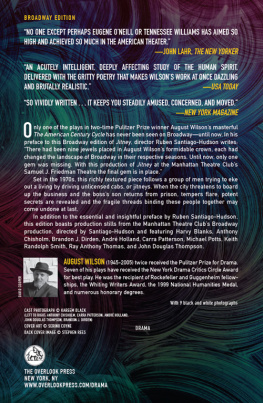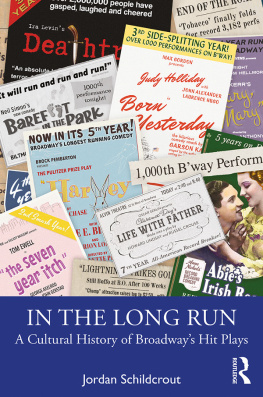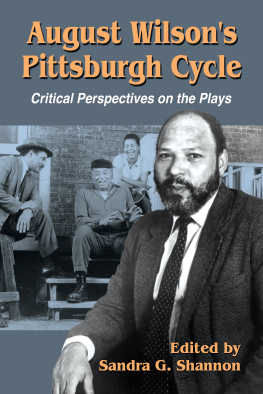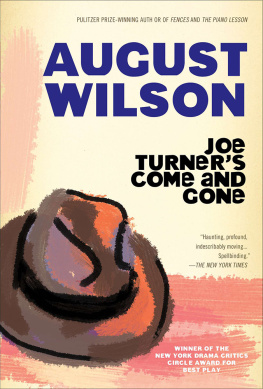This edition published in paperback in the United States in 2017 by
The Overlook Press, Peter Mayer Publishers, Inc. N EW Y ORK : 141 Wooster Street New York, NY 10012 www.overlookpress.com [for individual orders, bulk and special sales, contact our Woodstock office] Copyright 1979-2000 by August Wilson Introduction copyright 2001 by Marion Isaac McClinton Preface copyright 2017 by Ruben Santiago-Hudson All Rights Reserved. No part of this publication may be reproduced or transmitted in any form or by any means, electronic or mechanical, including photocopy, recording, or any information storage and retrieval system now known or to be invented without permission in writing from the publisher, except by a reviewer who wishes to quote brief passages in connection with a review written for inclusion in a magazine, newspaper, or broadcast. CAUTION : All performance rights in this playincluding stock and amateur rights in the USAare strictly reserved, and application for performance, etc., should be made before rehearsal to August Wilson, 600 First Avenue, Suite 301, Seattle, Washington 98104, attention: Dena Levitin. No performance may be given unless a license has been obtained. ISBN 978-1-4683-1576-9
 AUGUST WILSON
AUGUST WILSON (April 27, 1945-October 2, 2005) is the author of
Gem of the Ocean, Joe Turners Come and Gone, Ma Raineys Black Bottom, The Piano Lesson, Seven Guitars, Fences, Two Trains Running, Jitney, King Hedley II, and
Radio Golf.
These works explore the heritage and experience of the descendants of Africans brought to North America, decade-by-decade, over the course of the twentieth century. The plays form a compilation entitled The American Century Cycle. August Wilsons plays have been produced on Broadway, at regional theaters across the country and all over the world. In 2003, Wilson made his professional stage debut in his one-man show, How I Learned What I Learned, currently touring and featuring Eugene Lee reprising Mr. Wilsons role. His works garnered many awards including Pulitzer Prizes for Fences (1987); and for The Piano Lesson (1990); a Tony Award for Fences; Great Britains Olivier Award for Jitney, and Ma Raineys Black Bottom, as well as seven New York Drama Critics Circle Awards for Ma Raineys Black Bottom, Fences, Joe Turners Come and Gone, The Piano Lesson, Two Trains Running, Seven Guitars, and Jitney.
Additionally, the cast recording of Ma Raineys Black Bottom received a 1985 Grammy Award, and Wilson received a 1995 Emmy Award nomination for his screenplay adaptation of The Piano Lesson. August Wilsons early works included the one-act plays The Janitor, Recycle, The Coldest Day of the Year, Malcolm X, The Homecoming, and the musical satire Black Bart and the Sacred Hills. He received many fellowships and awards, including the Rockefeller and Guggenheim Fellowships in Playwriting, the Whiting Writers Award, and the 2003 Heinz Award. August Wilson was awarded the 1999 National Humanities Medal by President Bill Clinton and received numerous honorary degrees from colleges and universities, as well as the only high school diploma ever issued by the Carnegie Library of Pittsburgh. He was an alumnus of New Dramatists, a member of the American Academy of Arts and Sciences, a 1995 inductee into the American Academy of Arts and Letters, and on October 16, 2005, Broadway renamed the theater located at 245 West 52nd Street The August Wilson Theatre. Today, he is considered one of Americas finest playwrights.
New York Public Radio recorded all ten plays in The American Century Cycle at the Greene Space, casting many of the actors that worked on the original productions. PBS aired a documentary on August Wilson entitled The Ground On Which I Stand as part of the American Masters series. In December of 2016, a full feature film of August Wilsons Fences was released. August Wilson was born and raised in the Hill District of Pittsburgh, Pennsylvania, and lived in Seattle, Washington, at the time of his death in 2005. He is immediately survived by his two daughters, Sakina Ansari and Azula Carmen Wilson, and his wife, costume designer Constanza Romero, who is the executor of his estate. For Azula Carmen Wilson
who burst upon the world clothed in the light of angelic grace.You are more blessing than I deserve. The publisher would like to extend special thanks to the
following people for making this Broadway edition
of Jitney possible: Ruben Santiago-Hudson, Joan Marcus, Kareem Black,
Debra Waxman and the team at Manhattan Theatre Club,
the team at Serino Coyne, and Constanza Romero and
the August Wilson Estate.
Thank you!  Tony and Obie Award winner Ruben Santiago-Hudson recently directed the world premieres of Dominique Morriseaus Skeleton Crew at the Atlantic Theater and Paradise Blue at the Williamstown Theatre Festival. Mr. Santiago-Hudson won a Tony when he starred in August Wilsons Seven Guitars on Broadway and later went on to direct the play himself to high praise. Other directing credits include The Piano Lesson, The First Breeze of Summer, Cabin in the Sky and many more. The multi-award-winning director and actor wrote, executive produced and starred in the HBO film Lackawanna Blues, based on his award-winning play. It received several honors, including Emmy, Golden Globe, Humanitas, National Board of Review and Christopher awards.
Tony and Obie Award winner Ruben Santiago-Hudson recently directed the world premieres of Dominique Morriseaus Skeleton Crew at the Atlantic Theater and Paradise Blue at the Williamstown Theatre Festival. Mr. Santiago-Hudson won a Tony when he starred in August Wilsons Seven Guitars on Broadway and later went on to direct the play himself to high praise. Other directing credits include The Piano Lesson, The First Breeze of Summer, Cabin in the Sky and many more. The multi-award-winning director and actor wrote, executive produced and starred in the HBO film Lackawanna Blues, based on his award-winning play. It received several honors, including Emmy, Golden Globe, Humanitas, National Board of Review and Christopher awards.
Santiago-Hudson stars alongside Anika Noni Rose in BETs new drama The Quad, premiering in January 2017. Santiago-Hudson recurs on Showtimes Billions and recently starred in TNTs Public Morals. The Lackawanna, NY, native opened the Ruben Santiago-Hudson Fine Arts Learning Center in 2014 in his hometown.
Ruben Santiago-Hudson
That fall day in 1984 when I made my way to the Cort Theater to experience August Wilsons
Ma Raineys Black Bottom, directed by the great Lloyd Richards, little did I know that my life would be changed forever. The lights came up and when the actors began to speak, every fiber in my body began to tingle with the sense memory that I was home. I knew these voices, these stories, these people, intimately.
I knew how they smelled, the texture of their clothes and hair, the songs they sang on Sunday morning. I had known them my entire life growing up in a rooming house in Lackawanna, NY. These were salt of the earth Northern colored folk, people who were Southern colored folk before they moved north, escaping the Jim Crow South and chasing opportunity; in the great migration the only thing that changed about them was their location. As I watched these actors wax poetic I felt the moisture on my cheek and realized, Damn, Im crying. August Wilsons Ma Raineys Black Bottom was definitive proof that there was a place for every actor that looked like me, talked and walked like me, had a bop in their step, a little gangster lean and more than a twinkle of pride in their eyes. My first Wilson play was confirmation of what the brilliant Ossie Davis said when he wrote I find, in being black, a thing of beauty: a joy; a strength; a secret cup of gladness.
I was determined to track down who was responsible for making this incredible event happen on that stage, that touched me so, and to do everything in my power to join them wherever they were going. My journey with August Wilson began that day. Eleven years later I made my August Wilson debut in












 AUGUST WILSON (April 27, 1945-October 2, 2005) is the author of Gem of the Ocean, Joe Turners Come and Gone, Ma Raineys Black Bottom, The Piano Lesson, Seven Guitars, Fences, Two Trains Running, Jitney, King Hedley II, and Radio Golf.
AUGUST WILSON (April 27, 1945-October 2, 2005) is the author of Gem of the Ocean, Joe Turners Come and Gone, Ma Raineys Black Bottom, The Piano Lesson, Seven Guitars, Fences, Two Trains Running, Jitney, King Hedley II, and Radio Golf.  Tony and Obie Award winner Ruben Santiago-Hudson recently directed the world premieres of Dominique Morriseaus Skeleton Crew at the Atlantic Theater and Paradise Blue at the Williamstown Theatre Festival. Mr. Santiago-Hudson won a Tony when he starred in August Wilsons Seven Guitars on Broadway and later went on to direct the play himself to high praise. Other directing credits include The Piano Lesson, The First Breeze of Summer, Cabin in the Sky and many more. The multi-award-winning director and actor wrote, executive produced and starred in the HBO film Lackawanna Blues, based on his award-winning play. It received several honors, including Emmy, Golden Globe, Humanitas, National Board of Review and Christopher awards.
Tony and Obie Award winner Ruben Santiago-Hudson recently directed the world premieres of Dominique Morriseaus Skeleton Crew at the Atlantic Theater and Paradise Blue at the Williamstown Theatre Festival. Mr. Santiago-Hudson won a Tony when he starred in August Wilsons Seven Guitars on Broadway and later went on to direct the play himself to high praise. Other directing credits include The Piano Lesson, The First Breeze of Summer, Cabin in the Sky and many more. The multi-award-winning director and actor wrote, executive produced and starred in the HBO film Lackawanna Blues, based on his award-winning play. It received several honors, including Emmy, Golden Globe, Humanitas, National Board of Review and Christopher awards.